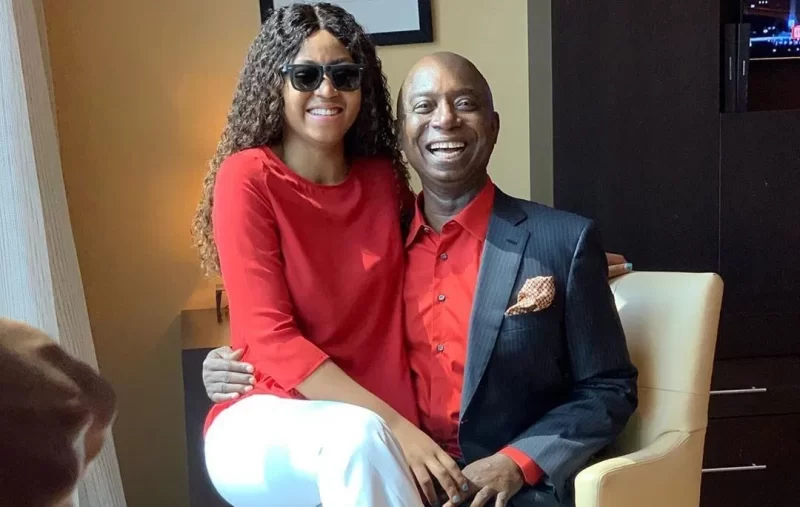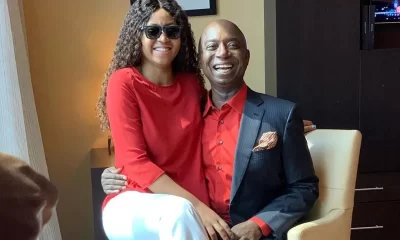Global Issues
Money Cannot Buy Love: Lessons From The Ongoing Feud Between Regina And Ned, By Isaac Asabor
Closer home again, the story of Tonto Dikeh and Olakunle Churchill offers another lesson. Their marriage, though initially filled with public displays of affection and luxury, ended in bitter acrimony. Despite Churchill’s wealth and social standing, the relationship collapsed under the weight of mistrust and emotional incompatibility. Their social media battles were a stark reminder that when love is not genuine, money only delays the inevitable heartbreak.

In a society increasingly driven by wealth, fame, and material validation, the notion that “money can buy love” has become a dangerous illusion, especially among young people. The unfolding feud between Nollywood actress Regina Daniels and her billionaire husband, Ned Nwoko, brings this illusion into sharp focus. Their relationship, once glamorized as the fairytale of wealth meeting beauty, now reads like a cautionary tale, a public unraveling that exposes the limits of money in sustaining genuine affection.
When Regina Daniels married Ned Nwoko in 2019, the internet almost went up in flames. The age gap between the two; Regina being barely out of her teens and Nwoko in his late fifties, sparked widespread criticism and debate. While some defended the union as a matter of personal choice, many Nigerians saw it as another example of wealth overpowering reason and love. Photos of the couple on exotic vacations and their lavish lifestyle initially painted a picture of bliss, but it did not take long before the cracks began to show.
Recent reports of discord between the actress and the businessman have reignited public debate about the authenticity of love in relationships built on material comfort. Although both parties have at various times tried to manage the narrative, it is hard to ignore the tension and bitterness that now seem to define their union. Regina’s social media posts, subtle but telling, reflect emotional fatigue, while conjectures suggest that the disagreements go beyond the domestic. To many observers, it is a classic example of how money can secure companionship, compliance, and comfort, but not love.
Without a doubt, money can buy many things, such as status, influence, beauty treatments, designer wardrobes, and even temporary loyalty, but it cannot purchase the emotional intimacy that makes love endure. Love, at its core, is spiritual and emotional, not transactional. It thrives on mutual respect, emotional connection, and shared values, things no amount of wealth can replace.
In relationships where money dominates, the dynamics become unequal. One party holds financial power, while the other often plays along for security or convenience. The imbalance might be tolerable for a while, but eventually, emotional dissatisfaction seeps in. The wealthy partner may feel used, while the less wealthy one may feel controlled or trapped. When the pretense fades, all that is left is emptiness; the hollow echo of what looked like love but never was.
Regina Daniels, in many ways, became the poster child of this reality. Her marriage to Ned Nwoko seemed to validate the widespread belief among some young Nigerians that wealth can fast-track happiness. But as the façade of marital bliss continues to crumble, it forces society to confront uncomfortable truths. Her situation demonstrates that luxury is not love, and that being surrounded by riches cannot compensate for the absence of emotional fulfillment.
Given the foregoing, it is germane in this context to draw lessons from similar stories. This is as the pattern is not unique to Regina and Ned. History, both local and global, is littered with examples of relationships where money failed to buy genuine affection.
Take for instance the case of Anita and Paul Okoye (Rudeboy) of P-Square fame. For years, they were seen as one of Nigeria’s most glamorous couples, successful, beautiful, and wealthy. Yet, despite their material comfort, their marriage collapsed. Anita filed for divorce in 2021, citing irreconcilable differences. The couple’s wealth, fame, and social status could not hold together what was emotionally broken. Their story reinforced the painful truth that even with mansions, luxury cars, and celebrity status, emotional disconnection can ruin everything.
Another striking example is that of Jeff Bezos, the world’s richest man at the time, whose marriage to MacKenzie Scott ended in divorce despite unimaginable wealth. Bezos had built Amazon into a global powerhouse, amassing over $100 billion, yet even that could not save his marriage. The divorce was amicable, but it showed that the emotional and spiritual bonds that sustain relationships cannot be substituted with money. Ironically, MacKenzie went on to become one of the world’s largest philanthropists, proving that while money can empower, it cannot heal emotional voids.
Closer home again, the story of Tonto Dikeh and Olakunle Churchill offers another lesson. Their marriage, though initially filled with public displays of affection and luxury, ended in bitter acrimony. Despite Churchill’s wealth and social standing, the relationship collapsed under the weight of mistrust and emotional incompatibility. Their social media battles were a stark reminder that when love is not genuine, money only delays the inevitable heartbreak.
Given the backdrop of the foregoing, it is expedient to opine at this juncture that what many young people fail to understand is that emotional poverty can exist even amid material abundance. You can live in a mansion and feel lonelier than someone in a one-room apartment. You can have a closet full of designer clothes and still feel naked in your soul. You can sleep on imported Egyptian sheets and still toss and turn from emotional unrest.
Money can create the illusion of happiness, but it cannot manufacture it. It can attract people, but not necessarily for the right reasons. Many marriages that begin on the foundation of wealth eventually expose a tragic truth that the partner who came for money often leaves for peace, and the one who used money to secure love ends up buying resentment.
The Ned Nwoko–Regina Daniels saga, whether exaggerated by gossip or not, is emblematic of this moral lesson. A young woman may have found herself in a gilded cage, while an older man, convinced of his financial power, may have discovered that love cannot be bought like real estate.
It would be unfair to heap all the blame on individuals when society itself glorifies materialism. In Nigeria today, many young women are raised to equate success with marrying the rich. Music videos, social media influencers, and even some parents reinforce the notion that wealth is the ultimate proof of worth. The concept of “love” has been hijacked by consumerism. Weddings are more about spectacle than sincerity, and many relationships begin not with shared dreams but with negotiated benefits.
This mindset creates a cycle of emotional emptiness. Young men, pressured by societal expectations, chase wealth, not for stability but as a means to command affection. Young women, on the other hand, chase wealthy partners as shortcuts to comfort. The result is a generation that confuses attraction with affection, and luxury with love.
At this juncture, it will not be out of place to sound a cautionary note to the youth who idolize wealth-driven love stories by urging them to learn from Regina Daniels, Ned Nwoko, and others before them. Money can buy attraction, attention, and temporary happiness, but it cannot buy commitment, peace, or the kind of love that stands the test of time. Genuine love is built on trust, respect, sacrifice, and emotional intimacy, values that have nothing to do with one’s bank balance.
If you chase love for money, you will end up with neither. Relationships built on material gain often crash when the excitement fades, leaving emotional scars that money cannot heal. Life’s richest blessings, laughter, loyalty, and peace of mind, are free, but only when shared with someone who truly values you.
The glamour of wealth fades. The thrill of luxury dulls. But genuine affection, born of sincerity, grows deeper with time. Do not trade it for fleeting material comfort. The current feud between Regina Daniels and Ned Nwoko is not just celebrity gossip; it is a mirror reflecting a society that has lost its moral compass in pursuit of wealth.
As the saying goes, “You can buy a house, but not a home. You can buy a bed, but not sleep. You can buy a ring, but not love.” The young generation would do well to remember that. Love, like respect, must be earned, not purchased. Those who chase money thinking it will lead them to love often end up rich in possessions but poor in happiness.
In the end, the feud between Regina Daniels and Ned Nwoko may fade from headlines, but its lesson will remain timeless: Money cannot buy love, and when love is for sale, everyone eventually pays the price.









